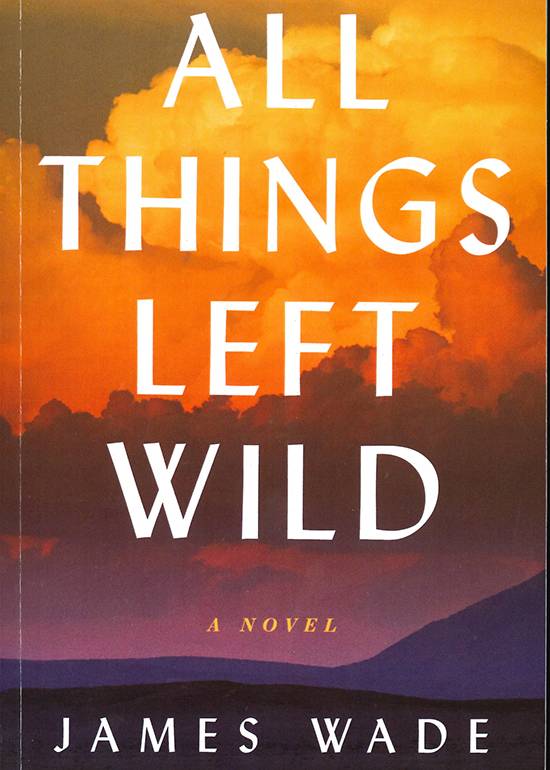The Wild That’s Still Waiting

All Things Left Wild
by James Wade
Ashland: Blackstone Publishing, 2020.
336 pp. $27.99 Hardcover.
Reviewed by
David Norman
In these confining times, literature that depicts the wide open spaces of the American Southwest can offer solace and escape, and there’s no better vehicle to take us there than James Wade’s novel, All Things Left Wild. In his exciting debut, Wade paints the Southwest in broad and masterful strokes, and his canvas inspires and terrifies as we follow its luckless inhabitants through an unforgiving wilderness. Set at the turn of the twentieth century, when American Indians have gone but their ghosts loom, when horseback remains the preferred mode of travel and revolutionaries harass both sides of the border, two brothers from Longpine, Arizona, set off on a serpentine quest, hunted by a father whose son they killed in a horse robbery gone wrong. The chapters alternate viewpoint between the hunter and the hunted, and what might otherwise feel like a straight-ahead collision course turns out to present a nice array of switchbacks, detours, and twists.
It’s unavoidable (and probably unfair) to compare Wade’s writing to that of Cormac McCarthy, master of the literary western, but readers will be relieved to discover Wade’s prose never devolves into parody; he carves out his own territory with sudden and powerful point-of-view leaps and with a convincing pair of strong female characters. In well-tempered and relentless prose, Wade’s sentences march across the page like dogs or wolves that don’t know how to quit the desert floor long after the sun has gone down.
If we can’t help but hear echoes of Blood Meridian, the parataxic style is still Wade’s for the taking. In All Things Left Wild, we meet Caleb Bentley, the younger brother who like his Biblical namesake demonstrates bravery and wisdom as he ventures with his older brother Shelby through what might be considered the Southwest’s version of Canaan.
For those who struggle to forge a life in this New Canaan, water and food are scarce and violence is always near. After an outlaw stabs Caleb in the leg, the woman he’s traveling with attempts rudimentary surgery:
“I have to pull it out,” she said, and I nodded and she grasped the knife handle and yanked and I hollered to hell and somewhere a thousand miles away in the Mexican mountains a lone wolf turned his yellow eyes to the daylight moon and howled.
Death haunts and howls these pages, and for Caleb in particular, death becomes an obsession. Despite the ease with which he slips into a murderous mindset, Caleb can’t shake his guilt over having shed innocent blood. Readers won’t find a Judge Holden in these pages, but the leader of the outlaw band called the Lobos comes close: Caleb falls under the leader Grimes’s spell but grows disenchanted after learning of Grimes’s plan to start a utopian society in the mountains, essentially by raping and impregnating the women they’ve captured. Fortunately, our hero sees behind the mask, and his escape will leave readers gasping for breath.
At times Caleb’s perspective might sound too old and wise for his sixteen years. A minor hang-up, to be sure. The unforgiving world into which he’s plunged would cause any kid to grow up in a hurry, but the way he comprehends his own suffering (“every evil man in a world full of them, might die by my hand and yet never could I heal the scar of guilt and culpability from my life or any I might thereafter seek to lead...”) would’ve seemed more plausible for this reader in the voice of a more mature, reminiscent narrator.
Regardless, Wade brilliantly contrasts the young, wise kid with the older, ignorant man Randall Dawson, who goes after his son’s killers at the behest of his forceful wife, Joanna. Dawson’s reluctance to give chase (“Darling,” [he pleads with his wife] “you can’t possibly believe I’m better equipped to hunt these men than a trained officer of the law.”) at first glance might seem like a writer’s misstep, but Dawson’s weakness only adds to the tension, stacking the odds against him, and his kindness, a liability everywhere he goes, endears him to Charlotte, a black woman from Texas who handles Dawson as skillfully as she handles her thirty-eight special.
All Things Left Wild is an enjoyable read and offers a much-needed respite from the isolation and claustrophobia we’re forced to endure these days. By chronicling his characters’ struggles to make peace with their past as they adapt to an ever-changing present, Wade takes readers on a thrilling journey in prose that’s crisp and rhythmic. Like Canaan, the Southwest is shaped more by its silences than by the men and women who stumble through it. Such tales are best heard over a good fire, under a night of stars, with no walls to confine. We can’t get out there yet, but novels like All Things Left Wild remind us that the “out there” hasn’t left us. Texas is alive, still plenty wild, and waiting.
David Norman is the author of South of Hannah. His short stories have appeared in The Best Small Fictions 2019, American Literary Review, Rio Grande Review, Gulf Stream, and elsewhere. A former editor of Texas Books in Review, he earned his MFA from Texas State University.
